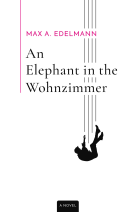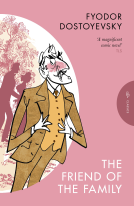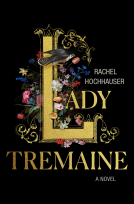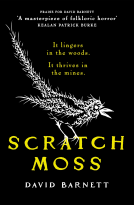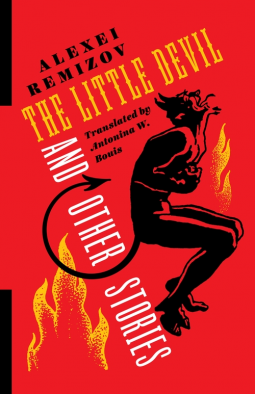
The Little Devil and Other Stories
by Alexei Remizov
This title was previously available on NetGalley and is now archived.
Send NetGalley books directly to your Kindle or Kindle app
1
To read on a Kindle or Kindle app, please add kindle@netgalley.com as an approved email address to receive files in your Amazon account. Click here for step-by-step instructions.
2
Also find your Kindle email address within your Amazon account, and enter it here.
Pub Date Apr 13 2021 | Archive Date Jul 21 2021
Talking about this book? Use #TheLittleDevilandOtherStoriesColumbiaUP #NetGalley. More hashtag tips!
Description
Alexei Remizov was one of the greatest writers of the Russian symbolist movement of the early twentieth century. In the thirteen stories collected in this volume, his exceptional stylistic achievements are on full display. Equally drawing on rural colloquial speech, the language of Russian fairy tales, and the customs of the Old Believers and Russian Orthodoxy, they transport the reader into a mysterious world in between uncanny folktales and encroaching modernity. The Little Devil and Other Stories includes works from across Remizov’s career, encompassing his thematic preoccupations and stylistic experimentation. Antonina W. Bouis’s translation captures Remizov’s many registers to offer English-language readers a sampling of a remarkable Russian writer.
Advance Praise
"Antonina W. Bouis gives a generous selection of the shorter prose of Alexei Remizov, a leading exponent of modernist fiction in Russia, whose work has remained largely inaccessible to Anglophone readers. The stories chosen span the more than five decades of his creative career and distill the leading themes of his work—evocation of the Russian city- and landscape, its people’s Christian and pre-Christian beliefs—all rendered with Gogolian verbal humor and Dostoevskian compassion for the insulted and the injured. "
—Roger Keys, University of St. Andrews
Available Editions
| EDITION | Other Format |
| ISBN | 9780231183819 |
| PRICE | $19.95 (USD) |
Average rating from 17 members
Featured Reviews
This is a collection of Russian short stories with a running theme of The Devil. I think these would be harder hitting and would make more sense to someone with prior knowledge of Russian culture and sayings. I think a lot of the impact of these stories gets lost in translation. I was really excited about the concept but I think in execution it falls flat.
While some of the stories were interesting, I had trouble staying engaged with most of them
Until I requested this book, I was unfamiliar with Remizov's writing, my prior focus on Russian literature having been firmly centred on the nineteenth century. Having now read these stories, I am grateful to Columbia University Press and Antonina W. Bouis for making this work available to English-language readers. The Little Devil and Other Stories is a delightful collection of tales, each of which is captivating and interesting in its own way. Naturally, I had some favourites among them, but all the stories were a pleasure to read. I appreciated the little introductory notes that provided some background on each story, and the translation flowed seamlessly, the prose easy to read. Based on my experience with this book, I would be keen to read more of Remizov's works in the future, and I recommend The Little Devil and Other Stories to anyone interested in the symbolist movement and/or early twentieth century European fiction. This book was a 4.5 star-read for me.
 John L, Reviewer
John L, Reviewer
I have to admit that plastering the obligatory star rating for books such as I get from this publisher all over the Internet never really sits that well, especially when I know they're for an expert, niche market and I can only pretend to be qualified in discussing them from the general audience point of view. This one, however, does feel like it deserves a negative rating, for the very fact this author has an awkward style. His stories always seem to be in first draft form – quick sentences, belying the common ground modernism had with the time he wrote them; things just jump from theme to topic to new characters and from focus to focus without a by your leave. There's a sort of naive artlessness to things at times, which I guess may have read in the original as welcome colloquialism, but doesn't exactly float my boat.
Several themes cross these pages with the help of local myths and folklore, from religion to the status of the home (as several were set in the 1905 Revolution, when the aristocrats were first liable to looting). Religiously, we have a young woman compelled to pray for a life-changing alteration to her lot – and getting one. The title story concerns (sac)religious goings-on in a house nobody is ever invited to enter, bar one man. The book closes with a look at a prince marrying the girl his page is in love with, asking whether this old Russian tale, oft-told apparently, talks of immorality or fate. Both aspects there – a household that inspires nothing but rumour, and the same menage a troi – combine in a third story; the love triangle was definitely something this author could not leave alone.
There certainly are stronger pieces, however – witness the ridiculous unrequited love a schoolboy has for the family lodger. Another lad, living with his grandmother, has lots of fancies, such as giving a chicken's egg to the turkey for it to lay and breed a turkey, becoming a human kite, and following his father into a career of crime, but while his naivety is bearable, his ideas are suddenly dangerous when the 1905 Revolution changes everything about them. A monastery fails to deserve its new inhabitant. There's a piece here about tragedy in the Borodin household, although it would appear not to be THAT Borodin. Perhaps the introduction, when ready, will tell us – but it wasn't included in my copy.
And anyway, each and every story gets a quick paragraph as way of introduction, without which we would be lost with many of these stories. A concession then from these publishers towards a general audience? It might be a one-off, but I would remain of the opinion these publishers are fine at presenting the slightly difficult authors, and that they've found a prime example here. Two and a half stars.
Russian translation of short stories about The Devil. A great way to introduce yourself to russian folklore. I enjoyed most of the stories in this book.
This is a collection of short pieces by Russian modernist Aleksey Remizov.
These are beautiful and emotional short pieces, a few had been translated before, but some are being presented in English for the first time, offering us glimpses into a world that is a harsh as it is lyrical.
Bedka, the opening piece is composed of brief diary entries written by Remizov during his exile in Vologda. This was also one of my favorite pieces in this collection. Common to Russian modern literature, the art here is heavily informed by the setting—places, people—and while the writing is wonderfully lyrical the reality it shows feels bleak and unkind. Even those moments that we could call happy—all represented by little Bedka, the innocent child—are embedded in a reality of solitude and scarcity—of warm, of food, of open joy—that soon is innocent no more. Nonetheless, the fractured narrative created by the punctual entries allows the reader to recreate the story by their own interpretation, so perhaps the bleakness I saw it’s nothing but the reflection of my own thoughts, and other may find this is a tale of the ultimate triumph of good in a world of little evils.
While Bedka may have been my favorite among these thirteen tales—I suspect the number was not randomly chosen but selected by design—The Sacrifice was the story I found the most haunting. At times, meaning eluded me as I read, but that only added to the atmosphere, the moment, as I tried to understand where good turns evil.
And that is the one thread giving coherence to this collection, the exploration of the nature of evil and goodness. These stories, each in its own way, explore a mythical perspective dictated as much by the ancient symbols of old beliefs as by the daily day occurrences of life under the encroaching eye of the Russian Orthodox Church.
Some stories are more accessible than others, and the base level of accessibility relies heavily on how familiar the reader is with Russian folktales and old superstitions. Regardless, reading each of the stories can become a beautiful experience if one is willing to let meaning flow loose of understanding while focusing of the beauty of the words and the rhythm of the narrative.
Definitively not everyone will be a fan, but I did enjoy it.
P.S. As a comment to the version I got from NetGalley, which is the one my review is based on, the introduction was not there. I knew there will be one because the page was marked with such title, but it was blank. I supposed that, since these are translated stories and some are new translations, there is a commentary about the reasons to re-translate and also perhaps about how the stories were selected for this collection, all of which I didn't get because the introduction was missing. Just wanted to clarify.
 Reviewer 516467
Reviewer 516467
Most likely my loss of interest in the stories was because I lacked historical context. There was heavy use of symbolism and repetition throughout the ones I did read. Maybe someone who better understood the tragedies of the time in Russia would appreciate them more.
The style of the prose was simple, almost blunt at times. I frankly did not enjoy the way the sentences were crafted most of the time.
Some stories are more accessible than others, yet none of them felt redundant; Remizov's writing style is simple and has a noticeable rythm, thanks to the exceptional translation.
 jean luc e, Librarian
jean luc e, Librarian
Fantastically weird, veering sometimes towards the absurd, these 13 tales could be an introduction to the Russian Symbolist Movement mostly predominant at the end of the 19th century & beginning of the 20th century on the Russian literary scene but you will need plenty of patience.
If you hanker after Realism in literature you may as well move on because these tales won't definitely be to your taste. If you are curious well...fasten your seat belt because the experience could be quite bumpy and you will need plenty of perseverance. Alexei Remizov, a Russian modernist writer, loved to delve into the absurdity of the Russian medieval folktales and come back with stories dripping of superstitions & hard to get mythological images entwined with peasants idiotic beliefs, deranged fairies and Orthodox obscurantism thrown into the cauldron to thicken the plot... if you are lucky enough to find or understand the plot to begin with....
To be honest I managed to go through 7 of them then I gave up for the time being. I was too exhausted. I couldn't take it anymore.
Back in 2017, Columbia published Remizov's novel "Sisters of the Cross" and surprisingly enough, it turned out to be less of a struggle to understand & appreciate it.
I would actually recommend it over these tales as a far as I'm concerned in order to get into Remizov's creative process or try to understand the symbolism behind his prose.
Alexei Remizov was adulated by the European literay establishment at the beginning of the 20th century especially by the Symbolist Movement. He was admired by Joyce (why am I not surprised?) but later on after WWI, as his work was falling into oblivion, he was despised by writers such as Nabokov who sarcastically said that the only positive thing that Remizov did in his long life was that "he really lived in the world of literature." Well for once I will agree, he probably lived in a very weird Russian folktale.
Worth a trial but don't feel bad if you give up before the end.
Many thanks to Netgalley and Columbia University Press for the opportunity to read this book prior to its release date
 Joseph C, Reviewer
Joseph C, Reviewer
Alexei Remizov (1877 - 1957) was born and raised in the Moscow merchant class and gravitated to Marxist politics while a student at the city’s university. In 1896, he was arrested during a clash between police and student demonstrators and was sentenced to six years’ imprisonment and exile in Vologda. These would turn out his formative years, at least as his literary style was concerned, since it was here that Remizov abandoned Marxism and became, instead, engrossed with philosophy, cosmogony and Slavic mythology and folklore. He also married a student of Russian art who moved in the same circles of painter, writer and philosopher Nicholas Roerich. It was under the influence of this milieu that, in 1905, he started to imitate medieval folk tales, including hagiographies of Eastern saints. For the rest of his career, his literary works retained fantastical, folkloric and archaic elements, although as evidenced by his early Symbolist novel Sisters of the Cross, only recently made available in English by Columbia University Press, social issues also remained a concern for this ex-Marxist.
In a bid to “de-Latinize and de-Frenchify the Russian literary language”, Remizov tended to combine the colloquialisms of spoken Russian with the style and vocabulary of fairy-tales and that of the sacred texts of the Orthodox Church. His idiosyncratic style scared off early potential translators – “he uses too many hard words” was one of the accusations levelled in his regard by a would-be translator. Hats off to Columbia University Press, then, for following up its edition of Sisters of the Cross, with The Little Devil and other Stories, a collection of thirteen tales. The work of Roger Keys and Brian Murphy, who rose to the challenge of rendering Remizov’s unique novel in the English language, is here ably matched by Antonina W. Bouis who does an equally great job in translating these stories and retaining the lilting, lyrical language of myth and fairy tale.
Indeed, many of the stories in this collection either verge on the fantastical, or are characterised by what we would nowadays describe as “magical realism”. The earlier items, such as “Bebka”, the opening story, have a stronger grounding in a specific, realistic settings. Towards the end of the volume, we get actual retellings of Russian folk tales. These are the stories I liked best, masterfully combining a modernist aesthetic with a colourful evocation of a magical past which (possibly) never was. Devils, saints, demons, magical creatures, princes and princesses, witches and common mortals, all rub shoulders in wonderfully exotic tableaux.
 Librarian 292885
Librarian 292885
This collection of short stories is certainly Russian, but less folkloric or fairy tale Russian, and more old world history and socio-economic issues Russian. I found this to be far more challenging to read, as someone not well-versed in Russian history but fascinated by the folklore and fairy tales that have come from Slavic and Russian culture. I was hoping for more fictional oddity and was met with much more serious storyline, which was actually very well put together and well-written, just not my expectation nor my preference. I do think someone more prepared and appreciative of general Russian history will be much more inclined to enjoy this collection of tales. And I can certainly see it being a very useful tool for a university course on Russian literature or even to add a literary approach to Russian history.
 Stella G, Reviewer
Stella G, Reviewer
YES. GIVE ME ALL THE RUSSIAN FAIRY TALES.
I think that this will be a very mixed review kind of book. Many will pick it up who have no knowledge of Russian literature, history, or customs and are drawn in by the word "devil." - They will not 'get' it. Then there are students of history, of Russian literature, of culture habits...and they will see it. They will understand it. They will 'get it'.
i'm happy to be one of these people.
Thanks to Netgalley and the publishers for the opportunity to read and review this book.
 Kathleen D, Reviewer
Kathleen D, Reviewer
𝐌𝐚𝐧𝐲 𝐭𝐡𝐢𝐧𝐠𝐬 𝐯𝐚𝐧𝐢𝐬𝐡𝐞𝐝, 𝐞𝐯𝐞𝐧 𝐯𝐞𝐫𝐲 𝐧𝐞𝐜𝐞𝐬𝐬𝐚𝐫𝐲 𝐨𝐧𝐞𝐬.
Alexei Remizov was an author of literary modernism and an expert calligrapher. He was a great Russian writer of the Russian symbolist movement, which I know little about, and read that it was an intelligent and artistic movement at the end of the 19th century. It was its own branch from European symbolism. Writing about feelings rather than reality. It states within this collection that the author gave up his Marxist beliefs and “became completely immersed in philosophy, cosmogony, and Slavic mythology.” He also put a lot of stock in dream divination and having read 𝘔𝘢𝘳𝘵𝘪𝘯 𝘡𝘢𝘥𝘦𝘬𝘢, the dream musings were wonderful. Alexei was imprisoned and exiled himself in the North Russia, with the information provided before reading it helps to imagine where the seeds for his writing were planted. These stories are bizarre, old customs I know nothing about, folk tales, the Orthodox Church, mysterious happenings. The truth is, much of the meaning is likely lost on me but it didn’t detract from my enjoyment. His pen was masterful in creating eccentric stories, if this collection is any evidence, borrowing from medieval Russian literature. He wrote his own versions of old Russian texts, as warnings, as lessons, sometimes humorous and horrifying tales, some that were in pre-Christian tradition. Food for ever curious minds, ‘suspicious curiosity’ that is.
In the stories there are connivers, inseparable lovers, destiny, the will of human beings, the confusion of fate, death, long cold winters, shoemakers, the revolution, peasants, and a long suffering grandmother. It is this grandmother’s beloved Petka (the little scamp) that broke my heart. Trouble comes for he and his grandmother, with the turn of each page and not even crossing herself when she hears the sound of shooting like thunder, can protect them from a world of hurt. There are so many kinds of poverty, none like the poverty of the heart.
Sacrifice is the theme in the old Borodin house where Pyotr Nikolaevich, joker and eccentric with the odd, pale face lives as if undead. Though a man with strange passions for looking at dead bodies, he is adored by his wife Alexandra, who saves the home from ruin. Then comes the sorrow, the coffins, the funerals. Corpses, rumors, death, the blessed house becomes filled with “anxiety and eeriness”. In 𝘛𝘩𝘦 𝘓𝘪𝘵𝘵𝘭𝘦 𝘋𝘦𝘷𝘪𝘭, there is a holy fool known as the Drowned Man, and pagan practices. An old woman, who isn’t truly old, falls in love which leads to the casting of a spell. Wanting can be a thing to fear. Children are troublesome or sick but Deniska keeps his sister entertained with his long and cruel stories. The two share a great dislike for the exterminator, the feeling is mutual. The man sees evil and filth everywhere, and he has his own deep secrets. People learn that a witch is better than all the riches in the word in a later story.
A collection populated by people expecting something horrible and unusual, which life readily delivers. The devil is always waiting, all it takes is a thought, and he will “come in a black whirlwind.” Not all hearts are evil, there are devout believers who remain steadfast in their faith. Intoxicating desire heats up in 𝘗𝘳𝘪𝘯𝘤𝘦𝘴𝘴 𝘔𝘺𝘮𝘳𝘢 when Atya is drawn like a magnet to the lodger in his family’s apartment. The boy cannot stop wandering into Klavdia’s room, this irresistible mistress who brings new life to everyone. There is humor in the boy’s innocence, one can’t help but feel for him. The stories are rich, the writing is beautiful and certainly there is an audience for it.
Publication Date: April 13, 2021
Columbia University Press
Readers who liked this book also liked:
Max A. Edelmann
General Fiction (Adult), Historical Fiction, Literary Fiction



